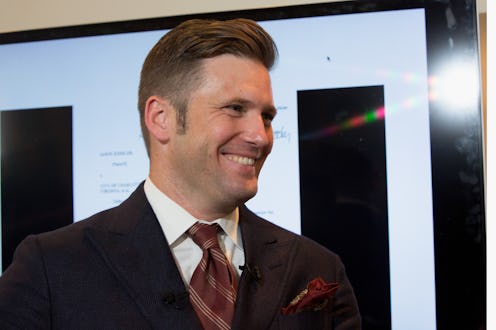News
Don't Mistake Rick Scott's State Of Emergency As A Denouncement Of The Alt-Right

On Monday, Governor of Florida Rick Scott declared a state of emergency in Alachua County due to an upcoming speech by white nationalist Richard Spencer at the University of Florida. On its surface, this appeared to be a rare instance of a Republican official standing up to right-wing extremism and the alt-right, given Spencer's history. But in a press release, Scott's office said that he declared the state of emergency "to assist local law enforcement's response to rallies planned on the University of Florida campus this Thursday," but the release never mentioned Spencer by name.
"While it's unclear what Scott's motivations are, this is a good example of why those of us who seek to shut down the Richard Spencers of the world don't do so by appealing to state authorities, but instead to mass mobilization against fascism," Drexel Professor George Ciccariello-Maher tells Bustle.
The executive order Scott signed to declare the state of emergency is very long (you can read it here), but in essence, it gives state agencies the authority to suspend certain regulations and allows state and local law enforcement to work together to provide security for the event. It also allows Scott himself to allocate surplus funds at the state level toward security for Spencer's speech if necessary, and designates the Florida Department of Law Enforcement as the chief agency for crisis management. The governor said he signed it at the request of Alachua County Sheriff Sadie Darnell.
"We live in a country where everyone has the right to voice their opinion, however, we have zero tolerance for violence and public safety is always our number one priority," Scott said in a statement. "This executive order is an additional step to ensure that the University of Florida and the entire community is prepared so everyone can stay safe."
Spencer is a highly controversial figure, and it's understandable that Florida authorities would anticipate violence ahead of his speech. In addition to advocating for "a White Ethno-State on the North American continent," Spencer refuses to denounce Adolf Hitler, and says that he's not sure women should have the right to vote. And although he denies being a neo-Nazi, a recently-unearthed video showed Spencer giving a Nazi salute during a karaoke performance by Milo Yiannopoulos, another white nationalist and alt-right personality. He was punched in the face in January, sparking off a heated debate about the morality of punching white nationalists.
State of emergency declarations can be implemented any number of ways, so it would be premature to draw any huge conclusions about the intent behind this one. Even after the fact, there isn't always a consensus as to how these declarations are used. When Virginia Gov. Terry McAuliffe declared a state of emergency during the white supremacist rally in Charlottesville (which Spencer also attended), those who marched in the rally argued that McAuliffe was attempting to suppress their free speech — while many on the left accused state police of prioritizing the white supremacists' safety over that of the counter-protesters. (McAuliffe, for the record, uniformly denounced the white supremacists and cited them as a reason for issuing the order.) It's still anybody's guess how this declaration of emergency will play out in Florida on Thursday.
Nevertheless, some have suggested that Scott's executive order could be used to crack down on protesters; other opponents of Spencer, like Ciccariello-Maher, argue that it's an example of the government's lax attitude toward right-wing extremism. However, it's important to note that Scott's order didn't specify what exactly it meant by "rallies" — it could have been referring to counter-protesters or potential white nationalist rallies sparked by Spencer's visit.
Gov. Scott has been a strong supporter of President Trump. However, after the Charlottesville violence, he denounced white supremacists and the Ku Klux Klan in stronger terms than Trump did, though he also refused to denounce Trump for claiming that there was comparable violence "on both sides" of the rally.
Spencer himself told the Associated Press that Scott's declaration was "flattering" but "most likely overkill."